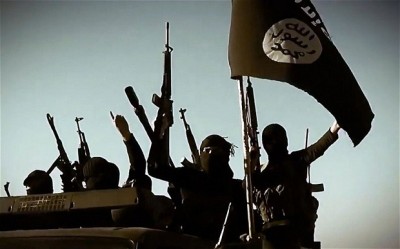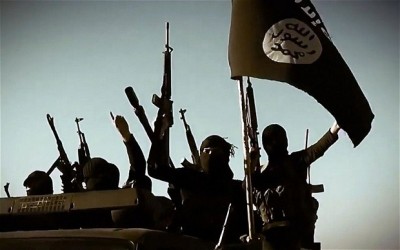 Jihadist fighters have begun preparing defences against American air strikes and a feared land-based counter-offensive in Iraq and Syria, according to residents living under their rule.
Jihadist fighters have begun preparing defences against American air strikes and a feared land-based counter-offensive in Iraq and Syria, according to residents living under their rule.
Fighters from Islamic State of Iraq and Al-Sham (ISIS) are mounting barricades, increasing checkpoints and booby-trapping the roads into Mosul in northern Iraq, they said. They have also begun sending their families out of the towns to safeguard them from the growing danger.
Air strikes by American and French fighter jets killed scores of men in an ISIS training camp and an arms depot near the city on Thursday and Friday. Residents estimated the number of dead at anywhere between 60 and 200.
ISIS has also evacuated command-and-control centres in both Mosul and Raqqa, the city in Syria which is the informal capital of its “caliphate,” and begun using Yazidi women captives as “human shields” in other key places.
“Two days ago, they left their main headquarters, and they moved to live inside our civilian neighbourhoods,” said one Mosul resident, who asked not to be named. “They took over all the houses abandoned by their inhabitants, such as the houses of the Christians, former officials and people who left the city. They also use the poorer houses as stores for weapons.”
In Iraq, Kurdish Peshmerga forces in the north and Iraqi army and Iranian-backed militia forces nearer Baghdad have stabilized front lines and even pushed ISIS back. The jihadists made big gains in the summer, but since August have lost control of the Mosul Dam and some towns and villages.
In Raqqa, their position is more secure and ISIS has set up its headquarters in the ornate former governor’s palace. They have pushed Syrian regime forces out of a number of major bases, killing hundreds of captives, and have been besieging Kurdish towns to the north.
Up to 100,000 Kurds and other local residents have fled to the Turkish border from the enclave that remains around the city of Kobane, as panic sets in. There were violent scenes on Sunday as refugees headed one way and Kurdish volunteers wanting to join the fighting headed the other. Turkish police trying to control the crowd clashed with protesters who were angry that fighters wanting to join the Kurds in Syria were not being allowed through.
In Raqqa itself, residents said both they and the fighters were afraid of promised American air strikes. ISIS was dispersing its military vehicles and men so they do not to become easy targets.
“People are afraid of the air strikes, that they might be used as human shields or be bombed,” said Abu Mohammed, a local activist who is still living in the Syrian city even though ISIS has put a price on his head. “Many people fled to the countryside or to Turkey. I can’t say how many went but in my lane there are just 15 families left.”
The ISIS fighters are taking similar precautions of their own, he added. “When small planes for reconnaissance appear the jihadists hide. They even lock the doors of their headquarters. They also moved their families, their women and children, outside Raqqa.”
In Mosul, where the local alliances that brought ISIS to power are complicated, additional precautions are being taken by the jihadists against the risk of assassination of their leaders. There have been repeated reports of local anti-ISIS hit squads attacking fighters.
The Mosul resident said four ISIS fighters were killed in the middle of last week. Some of the assassins turned ISIS’s puritan demands against them, disguising themselves under cloaks and niqabs, the full-face veil now demanded of women.
In both Mosul and Raqqa, opinion has turned against ISIS but it still has some residual support. Abu Mohammed, who runs the “Raqqa is being slaughtered silently” website that protests against behaviour by both the government and the Assad regime, said 20% of the population supported ISIS, and the rest were divided as to whether they supported American intervention or not.
“The people here don’t want ISIL [another name for ISIS] but they also don’t trust America,” he said. “If the U.S. is really against ISIS why did they leave them all that time, and why did they turn a blind eye to Bashar Al-Assad? He is a terrorist who bombing us.” Another resident claimed it would be easy for the U.S. to defeat ISIS. “The ISIL threat is exaggerated,” he said. “They are just fighters who won a battle because the other side just had light weapons. Moreover, they don’t have public support.”
ISIS’s behaviour in Raqqa, where they began public executions not long after their takeover and where they have since gloried in mass beheadings of captives, has put off many citizens, some of whom originally welcomed the law and order they brought. One reason ISIS is becoming unpopular is because of its celebrated lifestyle — the western comforts the foreign fighters bring with them, and sometimes share with their colleagues but not with local residents.
“Although there’s a war on, Swiss chocolate is very popular with them,” said another resident. “And you see some shops reserving western food for the jihadists.”
The trend extends as far as the smartphones the jihadists use to keep in touch and spread their message through social media.
“I know that one of them asked a store to get an iPhone 6 for him,” the resident said. “It cost $2,500, and was brought in from dealers in Turkey.”
National Post/ Telegraph


Leave a Reply
You must be logged in to post a comment.